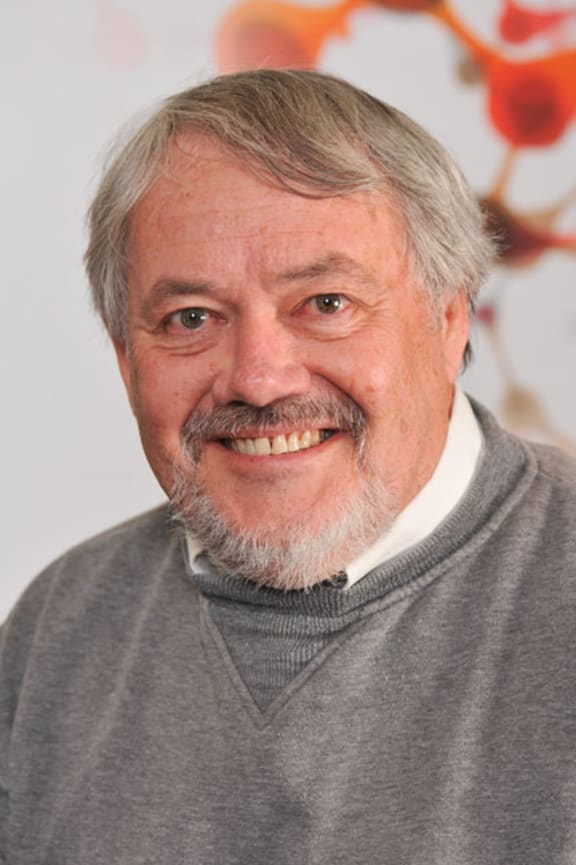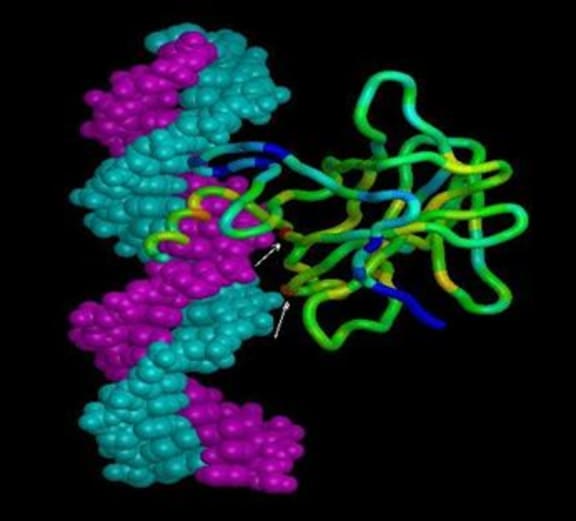You may have never heard of it, but P53 is the most studied single gene in history. And when it comes to cancer, it turns out to be one of the most important genes we have.
It has a Jekyll and Hyde personality: it can be described as ‘the gene that stops cancer’ – or the ‘gene that causes cancer’.
The story starts in 1979, when P53 was identified. At first, it seemed to be an oncogene – a gene that causes cancer cells to grow and divide uncontrollably, creating tumours.

Antony Braithwaite has been awarded the 2016 Shorland Medal. Photo: University of Otago
At the time, University of Otago researcher Antony Braithwaite was in Australia, working on adenoviruses, which are cold viruses. He was working on the genes in the virus that controlled cell DNA replication. He says that back then “it was hard to work on mammalian cells, but you could work on genes in viruses.”
“I did actually manage to identify the viral gene,” he says. “It’s called E1a … And that turned out to be a really famous observation.”
A change in focus
Already a leader in one field of science, Antony then read of another exciting breakthrough. It involved the P53 gene (the P, by the way, stands for protein, and the 53 is its molecular weight, which is 53,000 daltons).
Antony says the scientific article he was reading in Nature Reviews reported that “P53 stimulated cells to divide [and produce tumours], and functioned similarly to E1a in adenovirus. I thought that’s exciting – I want to go and work on P53.”
So, Antony switched his attention to P53 – but far from causing runaway growth in cancer cells, the p53 he was working on behaved like a tumour suppressor gene. These genes suppress or stop tumours – they’re good guys. They snap into action when a cell suffers DNA damage, and they either repair the damage or kill off the cell.

The P53 cancer gene (on the right) bound to DNA (the double helix on the left). The two small arrows mark parts of the P53 gene that are often mutated. Photo: Supplied
It was turning out that P53 comes in different forms - normal p53 and various mutated versions.
“Normal P53 – we call it the wild type – inhibited [cell] proliferation, and mutated P53 stimulated it,” says Antony.
P53’s link with cancer
Over the next four or five years, says Antony, literally hundreds of papers were published that linked mutated versions of the P53 genes to different kinds of cancer.
“Yes in colorectal cancer, yes in prostate cancer, yes in breast cancers – there were lots of tumours that had mutations in P53.”
We now know the most commonly mutated gene in people who have cancer is P53. In fact, more than 50% of all cancers involve a missing or damaged P53 gene. But there’s more to it than that.
“The evidence has accumulated so strongly in the last 20 years that if there’s not a mutation in the P53, then there’ll be a mutation in something that controls P53 or inhibits it from working,” says Antony. “Some people might shoot me for this – but I would say that defects in the P53 pathway occur in 100 percent of tumours.”
“A nasty piece of work”
Antony and his research group moved from studying the wild type of P53, the ‘good guy’, in cell culture, and began studying one of the mutant varieties, or isoforms as they’re known, in mice.
“This isoform is a really nasty piece of work,” says Antony. “It will make tumours invade, and it’s the invasion part, the movement around the body, that causes problems. If you’ve got a primary tumour you can remove it. So this is a metastatic oncogene.” That is, a gene that causes tumours to metastasise or spread, which makes cancers difficult to treat.
The search for a cure for cancer
Antony thinks that his research will help identify possible drugs to treat invasive cancers.
“We’ve worked out the molecular pathway that’s causing this [metastatic] invasion and there are known drugs that block the enzymes that are controlling that. The experiments that we’re about to write up show how we can inhibit the invasion.”
Antony is quick to point out that the research has not yet been carried out in animals, and that much more work is needed before any possible drugs can be tested in humans.
Elephants and P53
About 40 percent of us will get cancer. But if you’re an elephant your lifetime risk of developing cancer is just 3 percent. Research published just last year showed that part of this, at least, is due to the fact that while we have just one copy of the p53 gene, elephants have 20.
The Shorland Medal
Antony Braithwaite is in the Dunedin School of Medicine. He has won the Shorland Medal, which is awarded by the New Zealand Association of Scientists in recognition of major and continued contribution to basic or applied research that has added significantly to scientific understanding or resulted in significant benefits to society.

